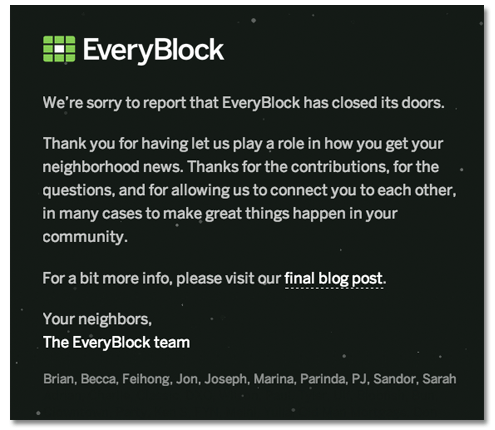When it comes to trendy terms of recent years, Everyblock seemingly had it all: big data, social functions, hyperlocal news and a passionate user base. But it seems that hot terms alone were not enough to carry the site. On February 7, 2013, Everyblock suddenly shuttered, steering visitors to a brief and unexpected goodbye message.
Founded in 2007 and acquired by MSNBC.com in 2009, Everyblock enjoyed a few years of relative success, becoming a darling of the press and treasured platform among connected communities. Founder Adrian Holovaty left the company in August of 2012, but seemed confident in the company’s future, saying he believed it would continue on “for a long, long time.”
The site was certainly popular with its user base, with a consistent stream of threads on the site’s neighbor message boards. Daily conversations ranged from notifications of lost dogs to crime concerns to thoughtful discussions on the implications of neighborhood pawnshops.
But alas, it seems that NBC no longer saw the value in a compassionate but yet-to-be-monetized community. Vivian Schiller, Chief Digital Officer of NBC News, explained to Poynter that ultimately, Everyblock “wasn’t a strategic fit with [their] growth strategy and — like many hyperlocal businesses — was struggling with the business model.”
The closure brings up an important and often overlooked disconnect between passion in the online space and true business sustainability. With that in mind, here are three key takeaways from Everyblock’s abrupt closure.
Likes aren’t sustainable
I liked Everyblock. I liked it on Facebook, and I liked it in real life. On the train this morning I felt a sharp pang of disappointment when I realized that I would no longer be able to pass the ride with Everyblock’s daily digest for my neighborhood. But the truth is, no matter how much my fellow neighbors and I “liked” Everyblock, at the end of the day, fans and enthusiasm aren’t enough. The same is true in the world of social campaigns, where likes are often misinterpreted as success. Handfuls, dozens, even hundreds of people can “like” something on Facebook, Pinterest or Instagram. But until we as brand marketers tie “likes” to real business objectives, they will continue to be mere noise in the social space.
Ads aren’t always the answer
A month before its closure, Everyblock debuted an advertising platform for local merchants called Neighbor Ads. The site started with simple native ads, which for testing purposes debuted exclusively in the Chicago market. But the ads didn’t take off. Maybe small businesses didn’t see the value in shelling out the bucks to target this psychographic. Maybe users reacted negatively to paid content. Maybe they were too expensive. Regardless of reasoning, the ads alone (although they didn’t have much time to prove their worth) were not enough to carry the company through hard times. Businesses are quick to jump to shiny advertising platforms like Facebook ads to drive new business when in reality, the platform isn’t right for everyone – including the hosting sites themselves.
Buzzwords don’t pay bills
Data. Social. Hyperlocal. These are fancy buzzwords that may or may not land your company on the coveted pages of TechCrunch. But it’s easy to contract tunnelvision when it comes to the “media of the minute.” Step back and consider two important things: inherent value to the user (which I believe Everyblock accomplished) and true sustainability. Data, social and hyperlocal are hip as can be right now, but how can you keep things going when the hype fades away? How can you turn that small, passionate audience into something meaningful?
What do you think? Could the downfall have been prevented, or was Everyblock’s sudden end inevitable?
